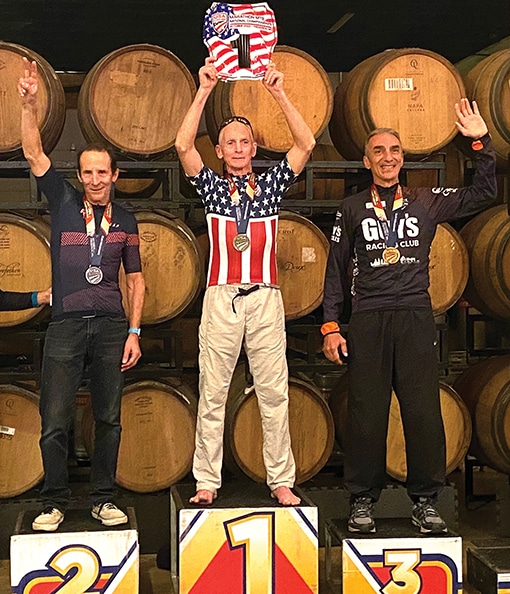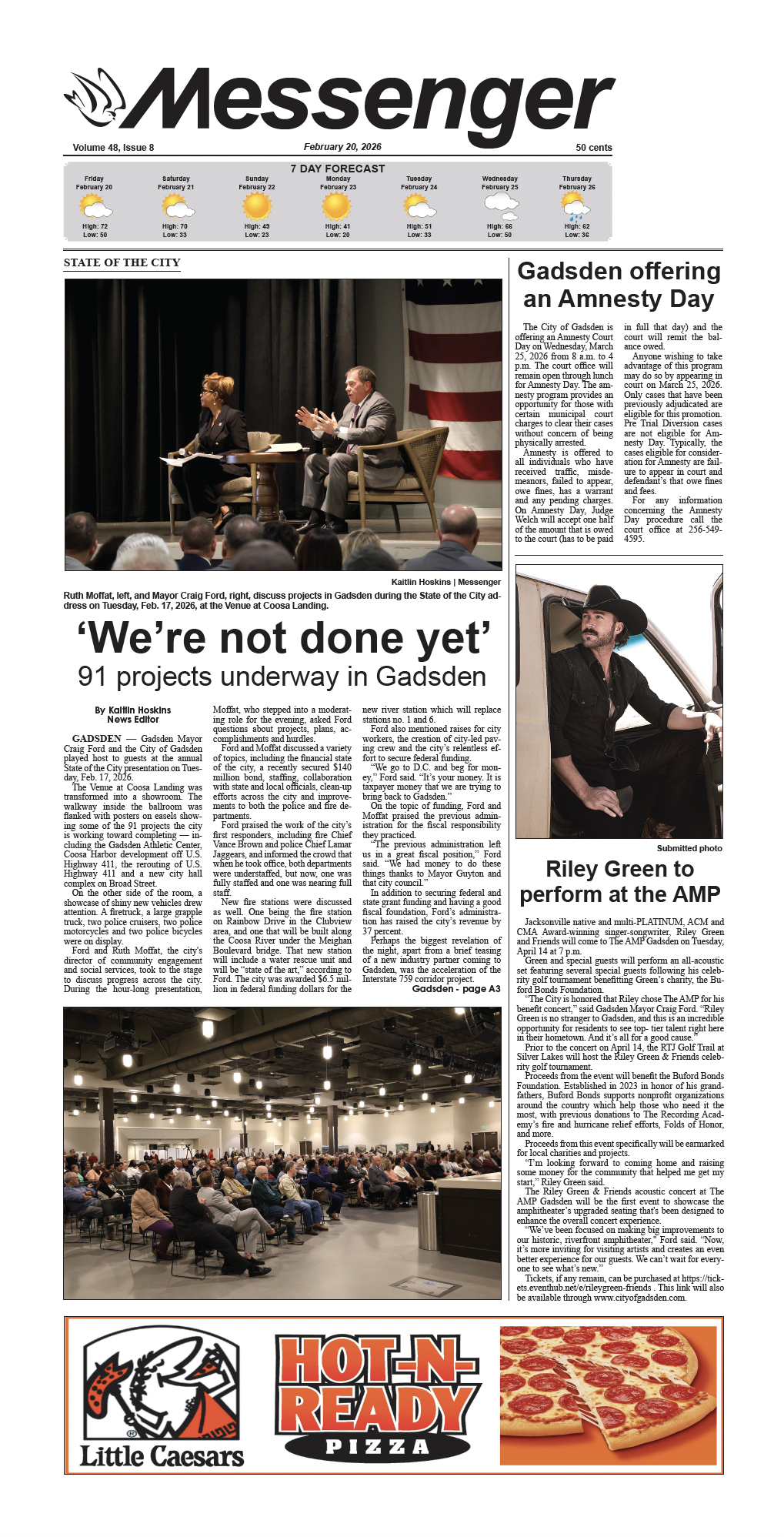Photo: Gadsden resident Randy Kerr (center) holds his first place trophy after winning the USA Cycling Marathon Mountain Bike National Championships on Oct. 23. (Courtesy of Randy Kerr)
By Chris McCarthy, Publisher/Editor
Whomever came up with the phrase, “no pain, no gain” must have had Randy Kerr in mind.
By all rights, the Gadsden resident should be licking his wounds and resting his 65-year-old bones in a rocking chair after suffering a number of serious injuries while competing in competitive cycling events over the past 47-odd years.
Instead, Kerr recently won his fifth national cycling championship at the USA Cycling Marathon Mountain Bike National Championships in the 32-mile race at Gambrill State Park on October 23 in Frederick, Maryland.
Kerr, who competed in the 65 to 69 age group, posted a winning time of three hours, 51 minutes and 53 seconds, approximately 19 minutes faster than the runner-up David Chomowicz.
“It was a great finish to a perfect day,” he said. “By ‘perfect,’ I don’t mean just the weather. I had a good night’s sleep, a good breakfast, a good stretch and warmup and a good starting position. The bike was dialed in, and my mind was focused on where it needed to be.”
Kerr quickly moved up to second place before passing the leader about 35 minutes into the race. Kerr rode over a large boulder while the leader chose to go around it, giving Kerr the lead for good.
“I had been training how to go up and over boulders, so that definitely helped,” said Kerr. “It took a big burst of energy to do it, but it wound up getting me ahead of him by a couple of seconds. I never looked back after that. It basically was a race of attrition, because there were a lot of rough sections with rocks that took full-body effort.
“This course is notorious for its technical difficulty. A good many folks had started out too hard, and a lot of them were walking their bikes near the end. It was rocks and rocks and then more rocks. I can’t over-emphasize how difficult and extreme that course was.”
Kerr noted that the designers of the course saved the worst for last, as riders had to negotiate a half-mile, uphill maze of crossties shorty before the finish line.
“Finishing a race like that where you’re totally exhausted both physically and mentally is very gratifying,” he said. “I’ll admit that I felt scared, because I didn’t want to risk falling. I also never thought that I’d regain the level of fitness it takes to get to this point. After it was over, I thanked God for choosing me to win.”
Kerr’s latest national championship is all the more impressive considering that he is lucky to be walking following a horrific crash just 16 months ago.
While training near the Nantahala Outdoor Center in Bryson City, North Carolina, in August of 2021, Kerr took a hard fall that resulted in a dislocated shoulder, several broken ribs and a fractured foot. He was riding with a team out of Anniston on trails that were overgrown. Kerr’s left bike pedal collided with a boulder about 20 minutes into the training run.
“The bike flipped, and I bounced off a tree and hit the ground hard,” he said. “I was disoriented for a few minutes but knew something was very wrong.”
Despite the intense pain, Kerr managed to walk his bike back to the trailhead with the other riders. He then drove himself from Bryson City to St. Vincent’s Hospital in Birmingham, a trip of almost five hours that must have seemed a lot longer considering Kerr’s physical state.
Upon arriving at St. Vincent’s emergency room, Kerr was informed that his wait would be approximately 12 hours.
“By that time, things were really starting to hurt,” said Kerr. “The pain was setting in, and there wasn’t any way to find comfort. They finally X-rayed me, gave me some pain pills and told me to see my local doctor. The whole thing was a nightmare.”
Kerr was eventually diagnosed with the displacement of ribs 3,4,5,6,7 and 8; fractures of the third, fourth and fifth metatarsals in his foot and a displaced fractured rib near the spine. Kerr also required a surgical insertion of a plate and bone graft of the right clavicle.
“Dr. Chris Kelley and Marcus Thompson of NEO and physical therapists Matthew Mills and Shon Frazier of Rehab Partners of Gadsden were instrumental in my recovery and pain management,” said Kerr. “They also each played a key role in motivating and coaching me back to ‘normal.’ Their expertise was invaluable.”
From September of 2021 to this past May, Kerr iced his fractured foot every night for 20 minutes. His fractured ribs were allowed to heal without treatment.
“It was tough,” he said. “The ribs probably hurt more than any of the other injuries. But over the years, I’ve fractured every rib at least once, so it was nothing new. With all of the ice treatments, my foot eventually became functional.”
Kerr’s racing and training without restraint over the years have resulted in rotator cuff tears in both shoulders requiring surgical repair; a displaced left clavicle requiring surgical insertion of a plate on two separate occasions; a fractured scapula requiring insertion of a plate; a torn meniscus requiring surgery accompanied with a fractured tibia; multiple tailbone fractures; a fractured wrist requiring a surgical plate; multiple fractures of every rib; a punctured lung and a torn hamstring.
“There’s an old cyclist saying that it’s not if you’re going to fall, it’s when you’re going to fall,” said Kerr. “That’s just part of it. It’s a lifestyle, and I don’t know any other way.”
During his latest rehabilitation, the possibility of stepping away permanently from competitive cycling never crossed Kerr’s mind.
“I was just focused on getting back to the point of being able go through normal, day-to-day activities,” he said. When you’re young, coming back from something like this is 10 weeks, tops. It took me from November (of 2021) to May. I learned a lot about patience, which is really about waiting on God’s time.”
Although not quite 100 percent healthy, Kerr returned to the competitive cycling circuit this past summer, starting with the Easter Classic and the Cheaha Challenge.
Kerr credits his wife Jeannie, daughters Kelly and Casey, son Brad and grandchildren Liam, Luke, Owen, Bennett and Caroline for their support and sacrifices.
“Without Jeannie, this all would not have been possible,” said Kerr. “She’s sacrificed so much for me and our children. She’s been instrumental in my success. We’re truly a team.”
Gadsden Outfitters remains Kerr’s primary sponsor, while the YMCA of the Coosa Valley is Kerr’s main non-cycling workout area.
“Trey Staples has gone above and beyond in taking care of my equipment and providing service,” said Kerr. “He’s a big part of my success. The Y is where I go for my recovery days and to work out any kinks. They’ve been really great to me.”
Kerr points to NASCAR racing as a good comparison to the competitive cycling circuit.
“There are so many variables like tire pressure and wea-ther, so mechanical problems are the big issue. In this sport, everything has to come together – the equipment, the training and the conditions.”
Kerr stressed that the mental preparation for a major race is just as important as the physical workouts.
“I like to push myself and see how far I can go. I’ve found that the workouts have to be intense, because it’s too easy to get in a comfort zone. I like to win, and that drives me.”
A Knoxville, Tennessee, native, Kerr relocated to Gadsden in 1977 at the age of 20 after attending the United States Military Academy at West Point for two years, where he played football and ran track. He and Jeanne married shortly after his arrival in Gadsden.
Kerr eventually earned a track and cross country scholarship to the University of Alabama, where Jeanne was attending. They both graduated from the Capstone in 1979, after which Kerr worked as an information systems coordinator at Republic Steel/Gulf State Steel for 18 years until the plant closed. In 1993, he established Southern Landscaping, LLC, which he recently retired from.
It was around 1981 when the emerging triathlon scene caught Kerr’s attention. The 2.4-mile swim, 112-mile cycle and 26.2-mile marathon run event was right up his alley. Kerr’s success in the event eventually led him to compete in the 1985 Ironman Triathlon World Championship in Hawaii, where he finished 189th out of a field of 1,050. He continued to compete in triathlons through the 1980s before deciding that his passion lay in the cycling portion of the event.
In 1987, Kerr was invited to the U.S. Olympic Training Center in Colorado Springs, where he participated in a two-week training program that determined whether cyclists were ready for the national stage. Although he did not make the cut, Kerr benefited from full-time coaching for the first time in his career. He finished 23rd in the 1987 USTS National Triathlon Championships and sixth in the 1988 Coors Light National Biathlon Championships.
From August of 1982 to October of 1992, Kerr won five state titles and finished runner-up twice in either mountain bike or road bike competition. During that 10-year span he earned 38 first place trophies and finished in the top five 46 times out of 129 races. Kerr began to compete in U.S. Cycling Federation events around the southeast.
For the next seven years, he threw himself into the demanding training schedule of competitive bike racing. His success at the state and national levels led to an invitation for to the Olympic Trials in 1992.
“I wasn’t part of a team and I didn’t have a full-time coach, which made it very difficult to compete at that level,” he said.
Toward that end, Kerr’s second stay in Colorado Springs signaled the beginning of the end of his ‘first’ cycling career. From 1993 to 2008, his bikes remained on their kickstands. Kerr’s reason for his self-imposed exile was simple.
“I pretty much had to quit cold turkey, because the feeling I got from the sport was almost addictive. The more I accomplished, the more I wanted to do. I continued to run and swim and work out with weights, but I had to step away from the competitive aspect of it and focus on other things in my life. We had small children who were at the age where they needed my attention, and I was just starting a new business.”
Kerr’s re-entry to the cycling world originated from a short ride on his mountain bike on Labor Day of 2008.
“I just felt so alive the next day, so the next weekend I went on a little bit of a longer ride,” Kerr recalled. “I felt just as invigorated, so I gradually got back into it. I wanted to prove to myself that I could still do it at a high level.”
Kerr said that although he enjoys winning as much as the next competitor, his first act upon crossing a finish line is giving glory to God.
“Winning has come with more than just training and sacrifice,” said Kerr. “I thank God for choosing me to be one of the best cyclists around. The verse, ‘Those who exalt themselves shall be humbles and those who humble themselves shall be exalted’ is always on my mind, whether I’m training or competing.”




